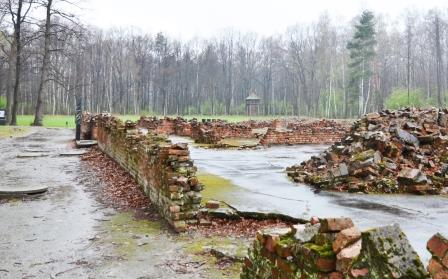International Symposium on the Sonderkommandos from May 23 to May 25, 2013 in Brussels
The Auschwitz Foundation and Remembrance of Auschwitz are organizing on Thursday 23, Friday 24 & Saturday, May 25, the Symposium “The forced labourers of death. Sonderkommandos and Arbeitsjuden” at the International Press Center – Residence Palace & the Royal Library of Belgium
Sonderkommando: noun (German, Sonder, special and Kommando, unit).
Unit of prisoners (mostly Jews) who were forced by the Nazis to participate in the eradication process, without necessarily perform themself the murdering part.

Now that the crimes, committed by the Wehrmacht, have been recognized for some part thanks to the large travelling exhibition dedicated to these facts between 1995 and the early years 2000, now that the visibility of the extermination in the East has reached unprecedented peaks thanks to the research on the “Holocaust by bullets”, now that Auschwitz has been visited over 1.3 million times last year, the historical and memorial recognition of the Sonderkommando and Arbeitsjuden (the closest witnesses of the “Holocaust by gas”) is still more difficult to achieve. Are the gassings only posted as background information? Are the (mandatory) actors of the most advanced mass murder in modern history still personae non gratae of history and memory?
The Sonderkommando of Auschwitz were the obligatory actors and direct witnesses of the gasification of the European Jews, Roma and Sinti, the deportees labeled as useless and of many Soviet soldiers. They were in the center of the Nazi extermination process, which had reached its highest level of technicality. However, their stories, written testimonies during the eradication itself or later recounted testimonies of survivors, despite the recent publications, recognized no real place in the memory of the genocide of the Jews. They were for a long time banned from the Jewish memory and depicted as devils by the deportees themselves. Following Primo Levi, some historians or philosophers classified them in the gray area, often reinterpreted in a negative way. The presence of the Arbeitsjuden in the other eradication centers became even more neglected.
This symposium aims is twofold. First goal is to make a balance of the Sonderkommando and Arbeitsjuden on an historical and memorial level. Then, to discuss the memory of the Sonderkommando in the broadest sense, their appearance in the testimony of the surviving deportees, in literature, theater and film.
Practical information
International Press Center – Residence Palace
Polak room (23-24)
Rue de la Loi, 155 – 1040 Brussels
(Subway: Schuman)
- Thursday, May 23, 2013 from 08h45 to 18h00
- Friday, May 24, 2013 from 09h15 to 18h00
Royal Library of Belgium
Lippens room (25)
Boulevard de l’Empereur, 4 – 1000 Brussels
(Subway: Gare centrale)
- Saturday, May 25, 2013 from 09h30 to 12h00
All interventions are simultaneously translated (ENG – FR – NL)
Free inscription but Reservation required
Please confirm your attendance by contacting the Remembrance of Auschwitz – Frédéric Crahay
Rue des Tanneurs, 65 – 1000 Brussels – Tel: +32 (0)2 512 79 98 – Fax: +32 (0)2 512 58 84 – Contact by Email
Contact
Auschwitz Foundation – Remembrance of Auschwitz
Rue aux Laines 17 box 50 – B-1000 Brussels +32 (0)2 512 79 98
+32 (0)2 512 79 98 info@auschwitz.be
info@auschwitz.be
BCE/KBO Auschwitz Foundation: 0876787354
BCE/KBO Remembrance of Auschwitz: 0420667323
Office open from Monday to Friday 9:30am to 4:30pm.
Visit only by appointment.
![]()
![]()
![]()
![]()
![]()
Become a member
To become a member of Remembrance of Auschwitz ASBL, please contact us and transfer the sum of €50.00 to our account IBAN: BE55 3100 7805 1744 – BIC: BBRUBEBB with the communication: ‘Membership fee 2025’. The membership includes two issues of 2025 of our scientific journal.
DONATIONS
Donations of €40.00 or more (in one or more instalments) qualify for tax exemption for Belgian taxpayers.
In communication, please specify that it is a ‘Donation’ and mention your National Number which is required since 2024 to benefit from the tax exemption.
Subscribe
Error : Please select some lists in your AcyMailing module configuration for the field "Automatically subscribe to" and make sure the selected lists are enabled

